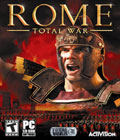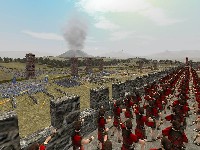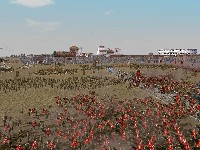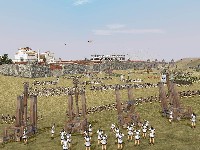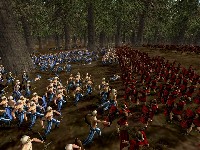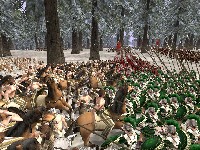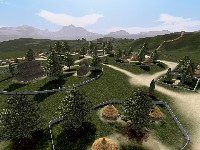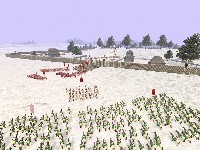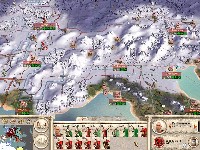Genre: Strategy
Publisher: Activision
Developer: The Creative Assembly
Release Date: September 22, 2004
Pre-order 'ROME: Total War': PC
Developer The Creative Assembly has been working for a long time on Rome – the third offering in the Total War series – and with all the hype, it was time to see if the game was prepared to deliver the experience promised at E3. If there were two words to sum up the impression left by Rome: Total War, it would be "Hail Caesar!"
Rome: Total War has so much going on at any given time that to truly contemplate the many interactions is overwhelming. The majority of the strategy for Rome takes place in the turn-based action of the overworld, with very decisive real-time battles determining your progress in the game. The tutorial gets the action going very quickly and controls are easy to learn, but the second battle makes it pretty clear that combat skills are essential to become more powerful than a regional thug. After hours of gameplay, the only thing anyone can be sure of is how challenging this game will be to master. Thankfully, with advisers and AI assistance, the game is still fun to play and learn.
Designed around the Roman Empire c. 250-300 B.C., Rome: Total War incorporates many of the complexities of Roman society as part of the game. With the Olympic Games in Athens this summer, we are reminded of the great structures these societies built. With the dark ages between their existence and today, it is often forgotten how advanced Rome was both socially and technologically.
With that in mind, TCA has created a highly customizable gaming experience that capitalizes on the essential elements of power politics and military strategy. The result is a story mode planning your rise to Emperor, historical scenarios, and multi-player combat modes supporting up to eight players.
The essential element to advance in story mode of Rome: Total War is combat, and it is the foundation for the multi-player environment. The obvious improvement in Rome for the combat engine is the individual units on the battlefield. The units are now 3D soldiers and machines making combat a full 3D experience. Not only do units look far better than the 2D sprites of the past, but the possible camera angles also make for amazing views of the action. It is possible to send your units into battle and then zoom in at ground level, yielding a view exactly as if standing right in the center of the action. We threw 2500 men into a massive melee battle, and to look all around from the center was an amazing visual experience. With a potential of over 10,000 units on the field at once, Rome: Total War has raised the bar for definition and complexity possible in a combat experience.
In single player mode, each battle is but a day, and turns in the overworld take six months. The overworld itself is far more appealing and logical than prior Total War titles. The map is 3D, and the characteristics of a location transfer into the battle map when violence breaks out. Changes in the terrain, like roads and mountains, affect the distance a character may travel, making the 3D map a truly integrated part of Rome, rather than a pretty skin on a reused interface from an earlier Total War episode. Parts of the map are even dynamic, and changes like volcanic eruptions are permanent both in the overworld and the rendering of the battlefield.
To succeed at Rome: Total War, the theory is to begin as a commander of a small faction within the Roman Empire and utilize military, economic, political, and familial successes to become Emperor. Military success is defined through combat mode, where sound defense of inhabited lands is as challenging as winning battles of expansion. However, even with all the development effort in creation of the combat environment, Rome: Total War provides the option of skipping battles entirely, letting game AI settle the score. This feature can speed up the game in the case of lopsided battles, and allows customizable gaming for players who may not be into combat as much as the non-violent elements of the game.
In building an empire, the Senate gives directives for the good of the empire, usually requesting war on enemy cities. In success are the spoils of gold, popularity, and increased political power. This is the main path in the long road to power. In order to find success, economic power is necessary from existing territories to fund and develop military operations. Rather than one overarching ministry of defense, each city must build the necessary capability for combat unit production, and management of each city's improvements and taxation determine total productivity. This makes capitalization of the unique strengths of cities very important. Rome: Total War makes it very easy to go bankrupt by developing each city in the same manner. Utilizing high tax rates on passive populations, and upgrading military facilities at certain cities that build effective units will produce greater returns on lower investments. A uniform strategy seems to be enough to barely keep up with the competition, making advantages in production and cash windfalls from the Senate very important to exploit.
After mastering control of effective development, further influence on the productivity of each city is the governor. If present in a city or military group, operations can be much smoother, but supply of these managers is essentially limited to the sons of the main character. Over time, daughters also marry off, and suitors can be accepted or denied to increase the quantity and quality of governors, affecting economic, political, and social power to hasten acquisition of territory within the expanding Roman Empire. Carefully allocating these family members, with the peaceful types running cities and warriors running field military units can have a real drastic effect. For fun, we swapped a very strong city manager type with a brave warrior. The result appeared to be less confident troops in combat, resulting in more units fleeing the battlefield. In the city, we didn't have enough time to see how much a warrior could muck up the morale and trade in a city, but it most likely is a minor difference.
Control of all these varied options is thankfully laid out in an interface that is simple enough to learn over time. The bright point is that mastery of the interface is on a learning curve ahead of mastering either combat or development techniques. This means that frustration comes from not having the finesse to outflank an opponent, rather than not being to execute the commands despite knowing how to succeed. By the time the Tutorial is complete, all the basic operational and battle techniques are well described and it is now up to the player to begin making – or taking – of Rome what they can.
Battle in Rome: Total War is much more complex than dropping a few thousand units on a battlefield and waiting for everyone to duke it out. The battlefield maps are very large, making fatigue, positioning, and timing very important factors. The longest battle we experienced lasted nearly 45 minutes, as the enemy amassed a human wall of troops at the gates of a city during an attempt to occupy the city. Without onagers (catapults) to drive a hole through the group, it took a continual hail of flaming arrows until the enemy was weakened enough to send in the war dogs to scatter their defenses. War dogs? Yes, war dogs! Essentially, a division of Rottweilers can be built to attack an enemy faction. They create disorder, loosen enemy formations, and even cause units to flee! Strategic utilization of specialty units like war dogs enable a fairly even matched battle to be turned into a decisive routing of the enemy, highlighting one of the many paths to mastery of the battlefield.
Visually, if it isn't obvious from the descriptions and vivid screen shots, Rome: Total War is a sensational piece of work. In the build we played, there were some issues like bad pixelation and camera hiccups, but we fully expect those to be resolved by release. Standing in the middle of a battle with foes and allies battling all around is truly a phenomenal experience that will give cause to drag non-gamer pals in the room just to take a look at the screen to say, "Wow, that's unreal..."
Audibly, the game is good. Opening speeches at the beginning of each battle are quite long, and we hope TCA is developing more than the handful currently active in the game, and richer master recordings are hopefully in development. Musically, the score seems to be well matched to the game throughout. Our only pipe dream for this title would be to have Dolby 5.1 Surround Sound for the battles so we could hear the battle rage all around us!
Rome: Total War is a great reminder of an ancient society, and just how far the human race hasn't progressed, despite the Industrial Revolution and the Atomic Age. In this game, political, economic, and military agendas are incredibly intertwined, yielding a complex and intriguing story. Those of you with a background in political science or philosophy will also appreciate the quotes on loading screens, reminding us just how much America is similar in attitude to the endlessly-warring Romans.
In the present build, everything seems well on its way to solid completion of a very ambitious project, and this might just be the title to redefine the next level of real-time strategy offerings for the PC, but only time will tell if Rome: Total War will win this fall's battle on the store shelves.
More articles about Rome: Total War













